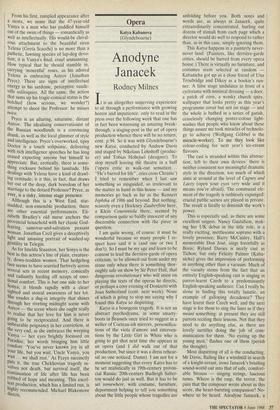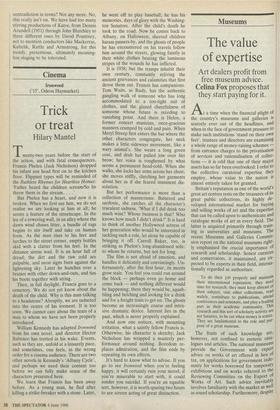Opera
Katya Kabanova (Glyndebourne)
Anodyne Janacek
Rodney Milnes
It is an altogether unnerving experience to sit through a perfonn'ance with growing horror and impatience, only to read in the press over the following week that one has in fact been witnessing an amazing break- through, a staging-post in the art of opera production whence there will be no return, cont. p.94. So it was with Glyndebourne's new Katya, conducted by Andrew Davis and staged by Nikolaus Lehnhoff (produc- er) and Tobias Hoheisel (designer). To stop myself leaving tlie theatre in a huff ('opera critic in walk-out sensation ... "He's barred for life", cries cross Christie') I tried to remember when I last saw something so misguided, so irrelevant to the matter in hand in this house — and my memories go back as far as the Rennert Jephtha of 1986 and beyond. But nothing, scarcely even a Hockney Zauberflote here, a Klein Cenerentola there, seemed by comparison quite so baldly innocent of any discernible connection with the piece in question.
I am quite wrong, of course: it must be wonderful because so many people I re- spect have said it is (and one or two I don't). So I must be my age and learn to be content to lead the derriere-garde of opera criticism, to be allowed out from under my stone only when there is something thor- oughly safe on show by Sir Peter Hall, that dangerous revolutionary who will insist on playing the texts of the operas he directs, or perhaps a cosy evening of Donizetti with Joan Sutherland (cont. next week). None of which is going to stop me saying why I found this Katya so dispiriting.
Katya is a bourgeois tragedy. It is not an abstract psychodrama, as some smarty- boots in Brussels once tried to suggest in a welter of Cocteau-ish mirrors, personifica- tions of the viola d'amore and interven- tions by the Little Girl in White who is going to get shot next time she appears in an opera (and I did walk out of that production, but since it was a dress rehear- sal no one noticed. Damn). I am not for a moment suggesting that every Katya has to be set realistically in 19th-century provin- cial Russia: 20th-century Budleigh Salter- ton would do just as well. But it has to be set somewhere, with costume, furniture, deportment helping to tell you something about the little people whose tragedies are
unfolding before you. Both notes and words are, as always in Janacek, quite extraordinarily concentrated, hurling out dozens of stimuli from each page which a director would do well to respond to rather than, as in this case, simply ignoring them.
This Katya happens in a painterly never- never land. (Painters, like derriere-garde critics, should be barred from every opera house.) There is virtually no furniture, and costumes seem selected at random — Kabanicha got up aS a close friend of Una Troubridge and Dikoy as a bookie's run- ner. A false stage undulates in front of a cyclorama with minimal dressing — a door, a patch of corn, a wonky church spire, wallpaper that looks pretty as this year's programme cover but not on stage — and the whole is bathed in a series of garish, ceaselessly changing poster-colour light- washes that people who know about these things assure me took miracles of technolo- gy to achieve (Wolfgang Gobbet is the miracle-worker). To me they look like colour-coding for next year's ice-cream flavours.
The cast is stranded within this abstrac- tion, left to their own devices: there is neither consistent nor meaningful dramatic style in the direction, too much of which aims at around at the level of Cagney and Lacey (open your eyes very wide and it means you're afraid). The communal ele- ment of the tragedy is ruthlessly expunged: crucial public scenes are played in private. The result is fatally to diminish the work's power.
This is especially sad, as there are some excellent singers. Nancy Gustafson, mak- ing her UK debut in the title role, is a really exciting, mettlesome soprano with a lovely presence; Barry McCauley, Hall's memorable Don Jose, sings forcefully as Boris; Ryland Davies is nicely cast as Tichon; but only Felicity Palmer (Kaba- nicha) gives the impression of performing in anything other than a vacuum. Much of the vacuity stems from the fact that an entirely English-speaking cast is singing in parrot-learnt Czech to a predominantly English-speaking audience. Can I really be alone in finding this totally lunatic, an example of galloping decadence? They have learnt their Czech well, and the next stage is for them to sing the lines as if they meant something: at present they are still parrots reciting their lessons. Not that they need to do anything else, as there are lovely surtitles doing the job of com- munication for them. 'No eyeing up the young men,' flashes one of them (perish the thought).
Most dispiriting of all is the conducting. Mr Davis, flailing like a windmill in search of a knight-errant, irons Janacek's bristling sound-world out into that of safe, comfort- able Strauss — singing strings, luscious tunes. Where is the rasp, the terror, the pain that the composer wrote about in this score, the heart-bursting compassion? No- where to be heard. Anodyne Janacek, a contradiction in terms? Not any more. No, this really isn't on. We have had too many stirring productions of Katya, from Dennis Arundell (1951) through John Blatchley to three different ones by David Pountney, not to mention conductors like Mackerras, Kubelik, Rattle and Armstrong, for this trendy, pretentious, ultimately meaning- less staging to be tolerated.



















































 Previous page
Previous page